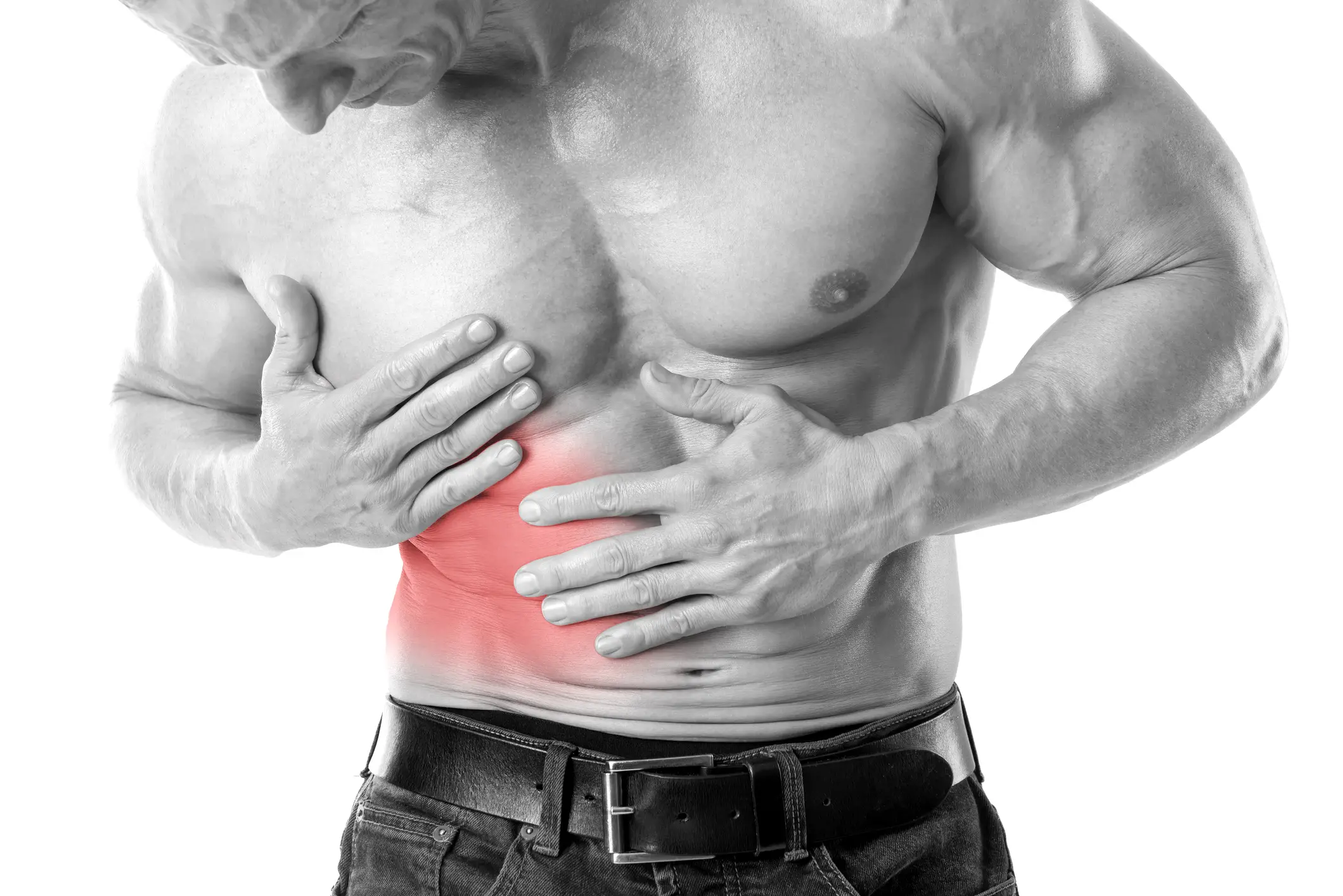If you’ve ever experienced blunt trauma to your abs, you may have wondered what it feels like to have bruised abs. Bruising of the abdominal muscles is a common occurrence in contact sports, such as football, hockey, and martial arts. It can also occur in non-contact sports, such as running, weightlifting, and gymnastics.
Bruised abs can cause a range of symptoms, including pain, swelling, and tenderness. You may also experience difficulty moving or breathing, depending on the severity of the injury. In some cases, you may notice discoloration or bruising on the skin overlying the abdominal muscles.
If you’re experiencing any of these symptoms, it’s important to seek medical attention to rule out more serious conditions, such as internal bleeding or organ damage.
Understanding Bruised Abs
If you’ve recently experienced a blow to your abdomen or have been doing strenuous exercise that involves your core muscles, you may be wondering what bruised abs feel like. Bruising occurs when there is damage to the muscle fibers and blood vessels in the affected area, leading to discoloration and pain. In this section, we’ll explore the symptoms of bruised abs and what you can do to alleviate the discomfort.
The rectus abdominis, external obliques, and oblique muscles are the core muscles that make up the abdominal wall. These muscles are responsible for supporting the spine, maintaining posture, and assisting with breathing. When these muscles are injured, you may experience pain, tenderness, and swelling in the affected area. You may also notice bruising or discoloration, which is a sign of tissue damage and bleeding under the skin.
The symptoms of bruised abs can vary depending on the severity of the injury. Mild cases may only cause discomfort when the affected area is touched or moved, while more severe injuries can cause intense pain and difficulty with movement. In some cases, you may also experience nausea or vomiting as a result of the injury.
To alleviate the discomfort of bruised abs, it’s important to rest the affected area and avoid any activities that may aggravate the injury. Applying ice to the affected area can help reduce swelling and alleviate pain. Over-the-counter pain relievers such as acetaminophen or ibuprofen can also be helpful in managing discomfort.
In conclusion, bruised abs can be a painful and uncomfortable experience. Understanding the symptoms of this injury and taking steps to alleviate discomfort can help you recover more quickly and get back to your normal activities. If you experience severe pain or other symptoms such as difficulty breathing, seek medical attention immediately.
Causes of Bruised Abs
When it comes to bruised abs, there are several possible causes. In most cases, the injury is the result of blunt trauma to the abdominal muscles. Here are some of the most common causes of bruised abs:
Injury or Trauma
One of the most common causes of bruised abs is injury or trauma. This can include direct blows to the abdomen, falls, or other accidents that cause damage to the abdominal muscles. Injuries sustained during contact sports such as football, tennis, or hockey can also result in bruised abs.
Lifting Heavy Objects
Lifting heavy objects can also cause bruised abs. This is because the abdominal muscles are responsible for stabilizing the body during lifting and other physical activities. When you lift a heavy object, the abdominal muscles may become strained or pulled, leading to bruising and other injuries.
Chronic Coughing
Chronic coughing can also cause bruised abs. This is because the repeated contractions of the abdominal muscles during coughing can lead to strain and injury. If you have a persistent cough, it’s important to seek medical attention to determine the underlying cause and prevent further damage.
Muscle Strains
Muscle strains are another common cause of bruised abs. This can occur when the abdominal muscles are overworked or stretched beyond their normal range of motion. If you experience pain or discomfort in your abs after physical activity, it’s important to rest and allow your muscles to recover.
Accidents
Accidents, such as car crashes or falls, can also cause bruised abs. In these cases, the force of the impact can cause damage to the abdominal muscles, leading to bruising and other injuries.
Pulled Abdominal Muscle
A pulled abdominal muscle can also cause bruising. This can occur when the muscle is stretched or torn, leading to pain, swelling, and bruising.
Overall, there are many possible causes of bruised abs. If you experience pain or discomfort in your abdominal muscles, it’s important to seek medical attention to determine the underlying cause and prevent further injury.
Symptoms
If you have bruised abs, you may experience a range of symptoms. Here are some common symptoms associated with bruised abs:
- Pain: You may experience pain in the abdominal area. The pain may be dull or sharp and may worsen with movement.
- Swelling: You may notice swelling in the abdominal area. The swelling may be localized or spread throughout the abdominal area.
- Bruising: You may notice bruising in the abdominal area. The bruising may be mild or severe and may be accompanied by discoloration of the skin.
- Tenderness: You may experience tenderness when you touch the abdominal area. The tenderness may be localized or spread throughout the abdominal area.
- Bleeding: In severe cases, you may experience bleeding in the abdominal area. The bleeding may be internal or external.
- Muscle spasms: You may experience muscle spasms in the abdominal area. The spasms may be mild or severe and may worsen with movement.
- Nausea and vomiting: You may experience nausea and vomiting due to the pain and discomfort associated with bruised abs.
- Abdominal pain: You may experience abdominal pain that may radiate to other parts of the body.
- Lump or bulge: You may notice a lump or bulge in the abdominal area.
- Stiffness and weakness: You may experience stiffness and weakness in the abdominal area.
- Discoloration: You may notice discoloration of the skin in the abdominal area.
If you experience any of these symptoms, it is important to seek medical attention. Your doctor can perform a physical examination and recommend appropriate treatment based on the severity of your symptoms.
Complications and Severity
Bruised abs can be painful and uncomfortable, but in most cases, they will heal on their own without any complications. However, in some cases, there can be complications that require medical attention. Here are some potential complications to be aware of:
Hernia
If you experience a severe abdominal injury, it’s possible to develop a hernia. A hernia occurs when an internal organ or tissue pushes through a weak spot in the abdominal muscles. Symptoms of a hernia include a bulge in the groin or abdominal area, pain or discomfort, and nausea or vomiting. If you suspect you have a hernia, it’s important to seek medical attention right away.
Right Side Pain
If your bruised abs are on the right side of your body, it’s possible that the pain could be related to your liver or gallbladder. In some cases, a bruised liver can cause right-side pain. If you experience severe or prolonged pain on the right side of your body, it’s important to seek medical attention.
Complications
In rare cases, a bruised abdomen can result in complications such as internal bleeding or organ damage. If you experience severe pain, nausea or vomiting, dizziness, or fainting, seek medical attention immediately.
Severity
The severity of a bruised abdomen can vary depending on the cause and extent of the injury. Mild cases may only result in minor discomfort and bruising, while severe cases can result in significant pain, swelling, and other symptoms. It’s important to monitor your symptoms and seek medical attention if you experience severe or prolonged pain or other symptoms.
Overall, while bruised abs can be painful and uncomfortable, they typically heal on their own without any complications. However, if you experience severe or prolonged pain, or other symptoms such as nausea or vomiting, it’s important to seek medical attention right away.
Diagnosis
If you suspect that you have bruised abs, it is essential to seek medical attention from a doctor. Your doctor will perform a physical exam to check for any signs of bruising, tenderness, or swelling in your abdominal area. They may also ask you questions about your symptoms, such as when they started and what makes them worse.
Your doctor may order imaging tests like an ultrasound or an X-ray to determine the extent of the injury. An ultrasound can help detect any internal bleeding or damage to your organs, while an X-ray can help identify any fractures or other injuries to your bones.
It is crucial to note that not all cases of bruised abs require medical intervention. In some cases, rest and ice may be enough to alleviate your symptoms. However, it is always best to consult with a medical professional to ensure that you are not overlooking any serious injuries.
In summary, if you suspect that you have bruised abs, seek medical attention from a doctor. Your doctor may perform a physical exam and order imaging tests like an ultrasound or X-ray to determine the extent of your injury. It is essential to follow your doctor’s advice and treatment plan to ensure a full recovery.
Treatment
If you have bruised abs, the first step in treatment is to rest. Avoid any activities that may cause further injury to the affected area. You may need to take a break from your regular exercise routine or sports activities until the bruising subsides.
Applying ice to the affected area can help reduce inflammation and pain. You can use an ice pack wrapped in a towel or a bag of frozen vegetables for 15-20 minutes at a time, several times a day.
Over-the-counter nonsteroidal anti-inflammatory drugs (NSAIDs), such as ibuprofen or naproxen, can help reduce pain and inflammation. However, be sure to follow the recommended dosage and do not take them for an extended period of time without consulting your doctor.
Compression and elevation can also be helpful in reducing swelling. You can wrap the affected area with an elastic bandage, making sure not to wrap it too tightly. Elevating the affected area above the level of your heart can also help reduce swelling.
If you experience muscle spasms, heat therapy may be beneficial. You can use a heating pad or take a warm bath to help relax the muscles.
Massage can also be helpful in promoting blood flow to the affected area and reducing pain. However, it is important to avoid massage in the early stages of the injury, as it can worsen the bruising.
In most cases, bruised abs will heal on their own with rest and self-care measures. However, if your symptoms persist or worsen, or if you experience severe pain, you should seek medical attention. Your doctor may recommend additional treatments, such as physical therapy or prescription pain medication.
Prevention
Preventing abdominal bruises can be challenging, especially if you are an athlete or engage in physical activities that put you at risk of getting hit or kicked in the stomach. However, there are some measures you can take to reduce your chances of getting a bruised abdomen.
Exercise
Regular exercise can help you maintain a healthy weight and build strong abdominal muscles, which can protect your internal organs from injury. Incorporating exercises that strengthen your core, such as planks, sit-ups, and leg raises, can help you develop a stronger and more resilient abdominal wall.
Stretching
Stretching before and after exercise can help improve your flexibility and reduce your risk of injury. Focus on stretching your abdominal muscles, as well as your hips, back, and legs, to ensure that your entire body is prepared for physical activity.
Prevention
If you participate in contact sports, wear protective gear, such as a chest protector or abdominal pad, to help cushion blows to your stomach. Additionally, avoid engaging in activities that put you at risk of getting hit in the stomach, such as sparring or wrestling without proper safety equipment.
Physical Activity
It is essential to maintain a healthy and active lifestyle to prevent abdominal bruises. However, it is equally important to listen to your body and avoid overexerting yourself. If you experience pain or discomfort during physical activity, take a break and allow your body to rest and recover.
By following these simple steps, you can reduce your risk of getting a bruised abdomen and enjoy a healthy and active lifestyle.
Recovery and Prognosis
After sustaining a bruised abdominal muscle, it is important to give your body time to heal. Recovery time varies depending on the severity of the injury, but it typically takes a few weeks to a few months for the bruised muscle to fully heal. During this time, it is important to avoid any activities that may cause further strain or injury to the muscle.
Your physical therapist may recommend specific exercises to help strengthen the affected muscle and prevent future injuries. These exercises may include gentle stretches, light resistance training, and core strengthening exercises. It is important to follow your physical therapist’s recommendations and progress slowly to avoid re-injury.
Getting enough rest is also crucial during the recovery process. Your body needs time to heal, and getting enough sleep can help speed up the healing process. Make sure to prioritize rest and avoid any activities that may interfere with your sleep.
The prognosis for a bruised abdominal muscle is generally good, and most people are able to fully recover with proper treatment and rest. However, in some cases, a more severe injury may require surgery or more intensive treatment.
Overall, it is important to listen to your body and take the necessary steps to promote healing and prevent re-injury. With proper care and attention, most people are able to make a full recovery from a bruised abdominal muscle.
Related Medical Conditions
In addition to bruised abs, there are several other medical conditions that can cause abdominal pain or discomfort. Some of these conditions include:
- Organ-related conditions: Conditions such as appendicitis, pancreatitis, and gallstones can cause abdominal pain. These conditions may require surgery to treat.
- Constipation: Constipation occurs when stool moves too slowly through the digestive tract. This can cause abdominal pain and discomfort.
- Abdominal muscle strain: An abdominal muscle strain can occur when the muscles in the abdomen are stretched or torn. This can cause muscle pain and weakness in the affected area.
- Broken bones: A broken bone in the abdomen can cause severe pain and may require surgery to repair.
- Menstruation: Menstrual cramps can cause abdominal pain and discomfort. These cramps are caused by the contraction of the uterus.
- Lower back problems: Problems with the lower back, such as a herniated disc, can cause pain that radiates to the abdomen.
- Thrombocytopenia: Thrombocytopenia is a condition in which there are too few platelets in the blood. This can cause bruising and bleeding, including in the abdomen.
- Leukemia: Leukemia is a type of cancer that affects the blood and bone marrow. It can cause abdominal pain and other symptoms.
- Von Willebrand disease: Von Willebrand disease is a bleeding disorder that can cause bruising and bleeding in the abdomen.
- Sports injuries: Sports injuries, such as impact injuries, can cause bruising and pain in the abdomen.
If you are experiencing abdominal pain or discomfort, it is important to see a healthcare provider for an accurate diagnosis and appropriate treatment. Depending on the severity of your symptoms and the underlying cause, treatment may include medication, surgery, or other interventions.






Leave a Reply